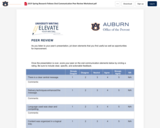
Once you have a draft of your oral presentation, this peer review worksheet can help you self-assess or get feedback.
- Subject:
- Composition and Rhetoric
- English Language Arts
- Material Type:
- Reading
- Provider:
- Auburn University
- Date Added:
- 10/07/2022

Once you have a draft of your oral presentation, this peer review worksheet can help you self-assess or get feedback.
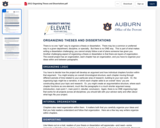
There is no one “right” way to organize a thesis or dissertation. There may be a common or preferred way in a given department, discipline, or specialty. But there is no ONE way. This is part of what makes writing a dissertation challenging; you cannot simply follow a set of plans someone has given you. Another challenging aspect of organizing a thesis or dissertation is that there are layers of organization. The overall project has an organization, each chapter has an organization, and you have to organize your ideas within and between paragraphs.
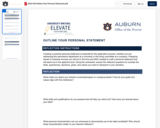
Creating a powerful personal statement is essential for the application process, whether you are addressing the admissions department at a university or the hiring committee at a company. Preparing ahead of schedule ensures you will put in the time and effort needed to craft a personal statement that will stand out in the applicant pool. Using this worksheet, answer the reflective questions to consider the skills, experiences, decisions, goals, and values you want to represent in your narrative.
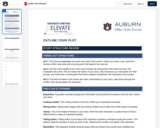
This worksheet reviews two types of story structure: the Three Act Structure and Freytag’s Pyramid. Space is provided to help you map your story out in both structures to decide which best fits your writing style.
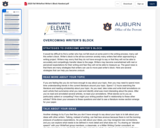
It would be difficult to find a writer who has notfelt stuck at some point in the writing process; many call this writer’s block. Writer’s block is the all-too-common anxiety many writers feel when approaching a writing project. Writers may worry that they do not have enough to say or that they will not be able to accurately and compellingly transfer ideas to the page. Writers may become overwhelmed with real or perceived expectations for their writing and fear they will not be able to measure up. The good news is that there are many strategies that writers can use to move past writer’s block. Here are several strategies that can help you become unstuck.
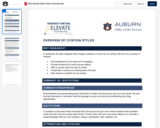
This handout introduces you to research, summary, paraphrase, quotation, attribution, citation, and citation systems .
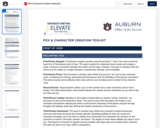
This worksheet discusses five points of view found in creative writing, notes tips for helping writers select a point of view, provides resources for writing and reading for diversity, lists questions to consider for character creation, and provides fillable character profiles.
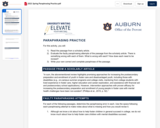
This worksheet will help you practice paraphrasing.
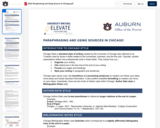
Chicago Style isstandard style of writing created by the University of Chicago also referred to as Turabian used by those in fields related to the humanities, business, and the fine arts. Typically, stylistic expectations reflect how professionals write in these fields. They impact how you:
•Organize your writing
•Cite references in the text and at the end of your writing
•Format your pages and headings
•Style your writing in paragraphs and sentences
Chicago style values cues, like transitions and previewing sentences so readers can follow your ideas more easily and locate important information. It also prefers simplified formatting so readers can focus on your ideas. Importantly, there are two kinds of citation style within Chicago: Author Date style or Bibliographic Notes style.
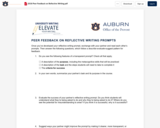
Once you’ve developed your reflective writing prompt, this peer reviewguide can help you get feedback.
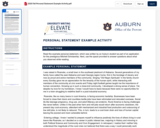
Read the example personal statement, which was written by an Auburn student as part of an application for the prestigious Mitchell Scholarship. Next, use the space provided to answer questions about what you observed while reading.
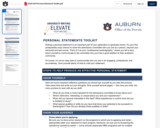
Writing a personal statement is an important part of your application to graduate school. It’s your first (and possibly only) chance to show the admissions committee who you are as a person, beyond yourtranscript and test scores. Think of it as your “professional autobiography,” where you tell a story about yourself to communicate to the committee why you’d be a good addition to their academiccommunity.
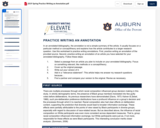
This worksheet will help you write an annotation for a source for an annotated bibliography
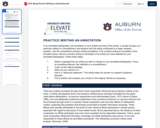
In an annotated bibliography, the annotation is not a simple summary of the article. It usually focuses on a particular method or concept/theory and explains how the article contributes to a larger research question. Use this worksheet to practice writing annotations. First, practice writing an annotation of the provided source. Second, practice writing an annotation of an article you have selected for your annotated bibliography.
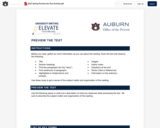
This worksheet will help you make important observations about a text before you begin reading it by previewing.
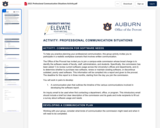
This activity invites you to participate in a realistic workplace scenario involving written communication.
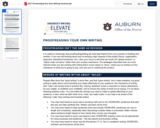
It is useful to remember that proofreading/editing are best kept distinct from your process of drafting and revision. If you are still thinking about and re-working major aspects of the project (focus, organization, argument, theoretical framework, etc.), then your focus is still what we would call “global revision” or “higher order concerns” rather than your surface mechanics. The strategies described here are more relevant when you are working with writing that is much nearer to “done,” where you’ve worked out the substance of what you’re going to say, and now you’re “polishing the surface.”
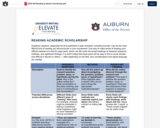
Academic research, especially the kind published in peer reviewed, scholarly journals, may be the most difficult kind of reading you will encounter in your coursework. One way to make sense of reading such difficult material is to find its major parts, which can fall under the broad headings of research questions, methods, and significant findings. It is worth noting that these parts will be easy to find in some articles and difficult to discern in others — often depending on the field. Key considerations and signal language are marked.
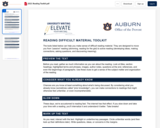
The tools listed below can help you make sense of difficult reading material. They are designed to move you from “passive” reading (skimming, reading for the gist) to active reading (developing ideas, making connections, asking questions, and discovering meaning).
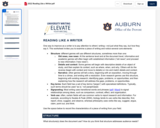
This worksheet helps you apply reading like a writer to your work by inviting you to examine written artifacts from a writerly perspective by paying attention to features like structure, key terms, signposting, and verb use.